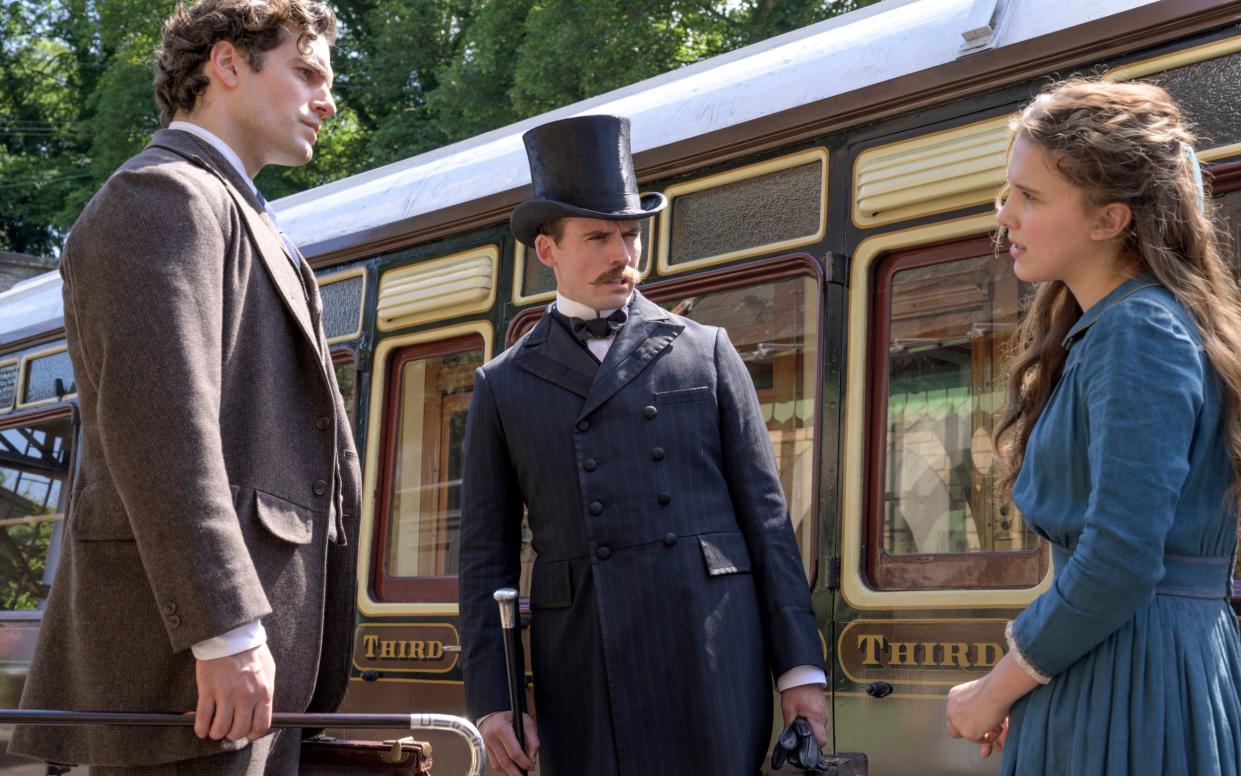Enola Holmes, review: Sherlock meets Fleabag in a zippy Conan Doyle pastiche

Dir: Harry Bradbeer. Cast: Millie Bobby Brown, Helena Bonham Carter, Henry Cavill, Sam Claflin, Louis Partridge, Adeel Akhtar, Fiona Shaw, Frances de la Tour, Burn Gorman. 12 cert, 123 mins.
Seeing an actor become a star over the course of a single film can feel like watching an investment spike. Sigourney Weaver in Alien, Brad Pitt in Thelma & Louise, Oscar Isaac in Inside Llewyn Davis: these were performances that made you feel savvy just for catching them, as if you were getting in at the start of something big.
Watching Millie Bobby Brown in Enola Holmes is very different: the 16-year-old British actress breezes on screen in this ebullient Arthur Conan Doyle pastiche as if her stock took off without you last week. It’s hard to recall when long-term stardom for a performer this young last seemed not merely like a likely outcome, but a deal their first lead role in a film had as good as sealed.
Brown has been appearing on “ones-to-watch” lists since she was cast in the Netflix horror series Stranger Things at the age of 11, and made her cinematic debut last year, as a supporting pensive moppet, in Godzilla: King of the Monsters. But in this adaptation of the first in a series of six young-adult detective novels by Nancy Springer – which centres on the teenage sister of Sherlock and Mycroft, herself a gifted sleuth in the making – she looks almost disturbingly at ease.
Buoyant and precocious without being even slightly annoying, Brown has pinpoint comic timing, infectious perk, and a wholesome, tomboyish aura: imagine a young Keira Knightley crossed with Phoebe Waller-Bridge. In fact, in the celebrated Waller-Bridge/Fleabag style, Jack Thorne’s screenplay even has Enola turn regularly to the camera and deliver wry asides in sisterly confidence. (It makes sense that the director of Enola Holmes is Fleabag’s own Harry Bradbeer.) The fact this ends up working at all – let alone as winningly as it does – becomes a source of ongoing amazement.
Would it be ungenerous to say the film could have ideally done with a couple more of those? Perhaps, perhaps not. Enola Holmes is never anything less than zippy family entertainment: as 12-rated films go, this is notably gentler than anything involving superheroes, and markedly less scary than Barry Levinson’s Young Sherlock Holmes from 1985, with its ghostly stained-glass knight and sentient cream cakes. But Bradbeer’s film rolls along so smoothly, there is little in it to startle or grip, let alone mystify or unnerve.
The central mystery involves the whereabouts of Enola’s mother Eudoria (Helena Bonham Carter), who disappears from the Holmes family’s country pile without warning, leaving nothing but a cryptic set of anagram-based clues behind. Enola’s grown-up brothers Sherlock (Henry Cavill) and Mycroft (Sam Claflin) return home to investigate, but fail to prevent their sibling from taking up the case herself.
On her travels she crosses paths with and befriends a runaway young lord (Louis Partridge), who is being hunted by a shadowy bowler-hatted assassin (Burn Gorman) – whose allegiances and aims become mystery number two. The two cases aren’t meaningfully connected, but both lead Enola on a whistle-stop tour around 19th-century England, from the bustling London streets to a finishing school for young ladies presided over by Fiona Shaw in Miss Jean Brodie mode.
There are capersome flashbacks to Eudoria’s offbeat parenting techniques – jiu-jitsu lessons, tennis in the library, and so on – and lots of nods towards the coming struggle for women’s suffrage, which Thorne perhaps ambitiously assumes younger viewers will apprehend without an in-film précis. What many will surely appreciate, though, is Enola’s playfully conspiratorial relationship with the audience, and also the repurposing of Cavill’s unusually hunky, non-eccentric Sherlock and Claflin’s moustache-twirling Mycroft as “cool dad” and “boring dad” types, on hand to either join in the fun or spoil it as the plot requires.
There are a few cases of colour-blind casting – the British Asian actor Adeel Akhtar is an enjoyably bumptious Inspector Lestrade, for instance – but they’re sporadic enough to feel half-hearted, as if someone saw Armando Iannucci’s The Personal History of David Copperfield a couple of weeks before filming began, and suddenly panicked about quotas.
Yet this is essentially Brown’s film alone: it’s even stressed repeatedly that Enola is “alone” in reverse, and the character thrives as a solo act. To shoulder a picture of this scale and tone at 16 is no mean feat, but Brown makes it look elementary.
Enola Holmes is available to stream on Netflix from September 23